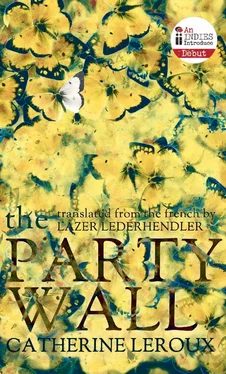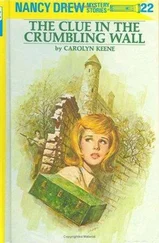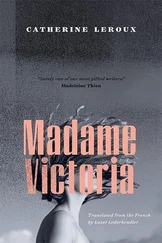Early one Sunday morning, a neighbour comes knocking at the door of their Montreal home looking ill at ease.
“I’m sorry, Marie, but have you been out of the house today?”
Marie shakes her head and steps out onto the porch, her feet clad in no more than a pair of pilled socks. Someone has written on the wall in green letters: Marie Leclerc, chienne de Goldstein. Rase-toi la tête, pute des Juifs . In short: Shave your head, bitch. Whore to the Jews.
The neighbour scarcely has time to offer a hand in repainting the wall. She shuts and locks the door, paces around the telephone, and finally dials Ariel’s number. They stopped communicating directly in January. Any contact between them goes through Marc, who efficiently and discreetly arranges their public appearances. Marie has written a thousand letters to Ariel but never sent them. She stores them in the sleeves of her husband’s bathrobe, which otherwise is a flat and mournful article of clothing, an empty skin. Over time, it has filled out thanks to the accumulated layers of paper.
“Is that you?” Ariel answers after one ring.
“It’s me. I don’t know what to do.”
She relays the message tattooed on the house. Of course, she knows what should be done: take pictures and then cover the writing while waiting for the police. That is not the reason she hesitates. What’s gnawing at her is the urge to climb a skyscraper, a mountain, or some other promontory and kiss her husband with the whole country looking on, to respond to the attack by causing a sensation. This affront, more than anything else, has eroded the wall so painfully erected between them. But she doesn’t know how to say this to Ariel. In any case, it would do no good.
“Don’t worry. I’ll handle it.”
She hangs up, shaken by the few sentences they exchanged. It takes so little. She sinks to the floor like a puddle of water. Planted in front of her, Wretch the cat looks at her with contempt. If he had opposable thumbs, she could swear he was to blame.
She waits all day for the government people to arrive, the ones that Ariel presumably will have sent to take care of the situation before the media arrive. To no avail. Around eight p.m., she hears a commotion outside. Believing the vandals have returned, she grabs her can of pepper spray, the holy water of solitary, nervous women. But a few seconds before opening the door, she drops her weapon. The person on the other side is Ariel; of this she is suddenly and absolutely certain.
She finds him in a ski jacket, gloveless, and shivering as he tries to pop open a container of paint with a dry branch while his two bodyguards prowl around the house.
“‘Spiced azure,’ wasn’t that it, the colour?”
Unable to do otherwise, Marie opens her arms to him.
After disclosing the terrible secret to Marc, Ariel had to solemnly swear to never again find himself alone with Marie. On that condition, his right-hand man succeeded in erasing all bureaucratic traces of the blood ties between the prime minister and his wife. As for Marie, she made the same promise to Rachel. Still, they do not feel they are cheating. They are the real victims, duped by reality, destined since birth to be ambushed, an unavoidable trap they did not deserve.
They make love all night, transported by a flood tide that lifts them above shame and biology; they climax each in turn, oblivious, their bodies nimble, their skins washed. They reiterate the only possible mode of existence for them — being together. Ariel traces with his finger the features of his wife’s face etched beneath the damp sheet.
“I never found that we looked alike,” he declares sadly.
“Yet that’s what others told us.”
“They say that about all lovers. When two people love each other they end up sharing a family likeness.”
“Lovers are all twins at the outset. Parts of a being believed to have been split in two. Plato described it as a body with four legs and four arms that Zeus is said to have sliced in two, fearing its power. The halves are condemned to search each other out.”
A blast of wind shakes the frame of the house, which sends a torrent of words of love spilling into the room. The language of wood. This house understands them.
They are awoken by repeated calls. It takes them a moment to untangle their naked limbs. The ringing of the telephone is a jarring din around their nucleus, where nothing retains its meaning, a magnetic field that overturns the laws of physics. They rise, neither happy nor sad but simply sated, filled with the same certainty that sustains migratory birds. After a few teetering paces in the cottony morning, Ariel finds his bathrobe stuffed with letters, which pour out of the sleeves when he steps into it. Marie floats down to the ground floor, hunts up a bag of frozen bagels and lights the oven. The heat spreads quickly. Ariel dawdles amid the familiar scents, calling the cat, which did not come home the night before.
“You have to go back to Ottawa right away?”
“Depends on the news,” Ariel answers as he switches on the TV.
A bizarre déjà vu takes shape on the screen. Their house. The empty swing pinned down by the weight of the snow. On the porch, the can of paint left behind the day before, the coat of blue half-concealing the green insults. At the bottom of the frame, a headline scrolls past. Another scandal for the Labour Party of Canada . The words trickle out with agonizing slowness. Marie gently parts the curtains and then turns around looking drained.
“They’re here,” she confirms.
The news ticker unfurls implacably. The Prime Minister … Ariel reads. The camera lens scans the grounds. Branches brought down by the ice appear on the screen… married … the text continues. The camera sweeps over the official car, where the bodyguards stand waiting impassively… to his sister , the TV concludes. At exactly that instant, Ariel and Marie simultaneously make the same unspoken wish: to never again leave this house.
THE STAIRWAY (MONETTE AND ANGIE)
Angie hasregained her composure. The calming effect that walking has on her — something she can’t explain — rises from her legs to her head in the same way the cold does when she goes out barefoot in the evening. She is a little ashamed now of having lost her temper, of letting Monette witness her anger against the birds, her useless, sentimental actions. Animals die every day in the wild, Mam says, and one ought not grieve over it any more than one rejoices at the birth of their offspring. Monette turns around a few times trying to spot the crows. Angie doesn’t ask her if they’ve returned.
The little girls leave the string of vacant lots and come back to the more populated section of the street, where the buildings are taller and much older. For the umpteenth time, Angie fingers the change nestled in the pocket of her shorts. It’s all there; everything is fine. They reach the bridge that crosses one of the countless rivers and streams running through the city — greenish, foul-smelling, yet teeming with the prodigious activity of sub-species of fish, salamanders, and tadpoles mired in a translucent mud through which their smooth or sudden movements can be discerned.
Monette stops halfway across the bridge, bends her head forward, and then looks imploringly at Angie, who signals her consent with a nod. The delighted younger sister diligently puffs her cheeks and lets fly a wad of spit that hits the surface of the river with a noticeable splash. Satisfied, she resumes her walk. When Angie crosses here alone, she takes the liberty of dropping something she’s found into the water, usually a piece of wood that will drift down to the sea. But not today.
Читать дальше











